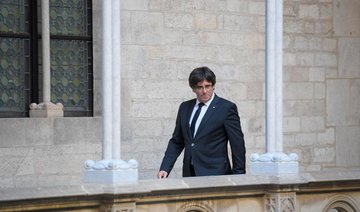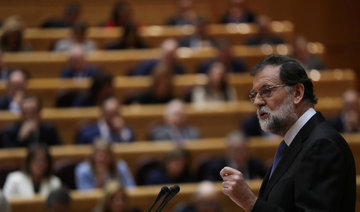MADRID/BARCELONA: Spanish Prime Minister Mariano Rajoy on Friday said he is firing the Catalan government as part of emergency measures the Senate approved following the region's declaration of independence.
Rajoy said he is dissolving the Catalan parliament and calling for a new regional election on Dec. 21.
Rajoy was speaking after a special Cabinet meeting to discuss what measures to take in the wake of the Catalan parliament's announcement of secession earlier Friday.
The firing of the regional leaders is likely to meet with fierce opposition in Catalonia, where thousands have been celebrating the independence declaration. The government has been authorized to dismiss the regional government and curtail the Catalan parliament's powers.
In one of the most momentous days in recent Spanish history, lawmakers in the Catalan regional parliament voted to unilaterally declare independence on Friday, prompting the government to immediately adopt special constitutional powers to stop the region’s attempt to secede.
Rajoy's conservative government called an emergency Cabinet meeting and later used its new powers to immediately dismiss the Catalan regional government and curtail the powers of its parliament in Barcelona. The Spanish government could also seize control of the Catalan police force and the region’s publicly-owned media outlets.
“Today, the Catalonia parliament has approved something that in the opinion of a large majority of people not only goes against the law but is a criminal act,” Rajoy declared.
The Spanish Senate’s decision to authorize the government to take control of Catalonia trumped the local parliament’s independence vote, which was a symbolic act that is doomed because Spain’s Constitutional Court is almost certain to disallow it.
Rajoy said he wants to call an early election in the prosperous northeastern region as soon as central authorities can ensure an orderly return to legality.
The battle around Catalonia’s future is far from over, however.
Madrid taking away Catalonia’s regional powers is likely to be seen as a humiliation and a provocation by Catalans. A backlash is anticipated, with street protests planned for Sunday, while regional government workers could follow a policy of disobedience or non-cooperation.
On top of that, an expected early election within six months could still deliver a steadfastly pro-independence Catalan parliament, even if recent polls have suggested the region of 7.5 million people is roughly evenly split on secession and some Catalans strongly oppose independence.
Rebellion charges
A spokesman with Spain’s prosecutor office said the prosecutor would seek to lay rebellion charges against those responsible for the Catalan independence vote.
The day of drama, featuring emotional speeches and scenes of joy and despair, went to the heart of Spain’s political and cultural history.
The 1978 Constitution, drawn up after the end of Gen. Francisco Franco’s decades-long dictatorship, created a decentralized Spanish state that devolved power to 17 autonomous regions, including Catalonia. The regions have broad administrative and legal powers. The Spanish Constitution, however, also describes Spain as “indivisible.”
Catalonia has its own cultural traditions and its own language. Having long seen themselves as different from Spain, the Catalan drive for independence began in 2010 when the Constitutional Court struck down key parts of a groundbreaking charter that would have granted Catalonia greater autonomy and recognized it as a nation within Spain.
Catalonia represents a fifth of Spain’s gross domestic product and many want the tax revenues generated by the industrious region to remain at home.
After the vote on independence in the Catalan parliament, an unprecedented challenge to Spain’s status quo, officials and lawmakers let loose cries of “Freedom!“
Outside parliament, thousands who had gathered cheered the news, some dancing and raising a toast.
Emotional vote
In Barcelona, people crowded around TV sets to watch the historical events unfold. The famous St. Jaume square outside the regional government office was packed with thousands of people celebrating. Many of them were draped with the “Estelada” flag that adds a blue triangle to the red and yellow Catalan flag and has become a symbol of the separatist struggle.
“I feel so emotional after the huge fight we went through, we finally got it ... the independence of Catalonia!” said 74-year-old Rosalina Cordera Torelles.
Nearby, 24-year-old Rita Carboneras could hardly contain her excitement.
“I’m super, super, super happy. Super excited,” she said. “So relieved. Now we are Catalan at last. We can be ourselves. We are just happy, look everyone around. Everything is so exciting.”
The exhilaration was short-lived. Some 500 kilometers (300 miles) to the south, the Senate in Madrid voted by an overwhelming margin of 214 to 47 in favor of granting the government exceptional powers.
“I call on all Spaniards to remain calm. The rule of law will restore legality to Catalonia,” Rajoy said on Twitter, adding that what is happening in Catalonia is “a clear violation of the laws, of democracy, of the rights of all, and that has consequences.”
The main opposition Socialist party supports Rajoy’s stance on Catalonia, and many Spaniards outside the region are scornful of Catalonia’s secession ambitions.
Rajoy has also received support from outside Spain, with other European leaders rejecting Catalonia’s claims. The US administration also backed Rajoy, after President Donald Trump last month branded the Catalan independence ballot as “foolish.”
“Catalonia is an integral part of Spain, and the United States supports the Spanish government’s constitutional measures to keep Spain strong and united,” US State Department spokeswoman Heather Nauert said in a statement.
Also supporting Rajoy’s warnings of trouble in Catalonia if it forges ahead with its secession bid, more than 1,500 businesses have moved their official headquarters out of Catalonia this month to ensure they can continue operating under European Union laws if Catalonia secedes. The EU says Catalonia will be tossed out of the bloc if it leaves Spain and would have to apply to become a member, a lengthy process.
___
Giles reported from Madrid. Elena Becatoros and Joseph Wilson in Barcelona contributed.

























